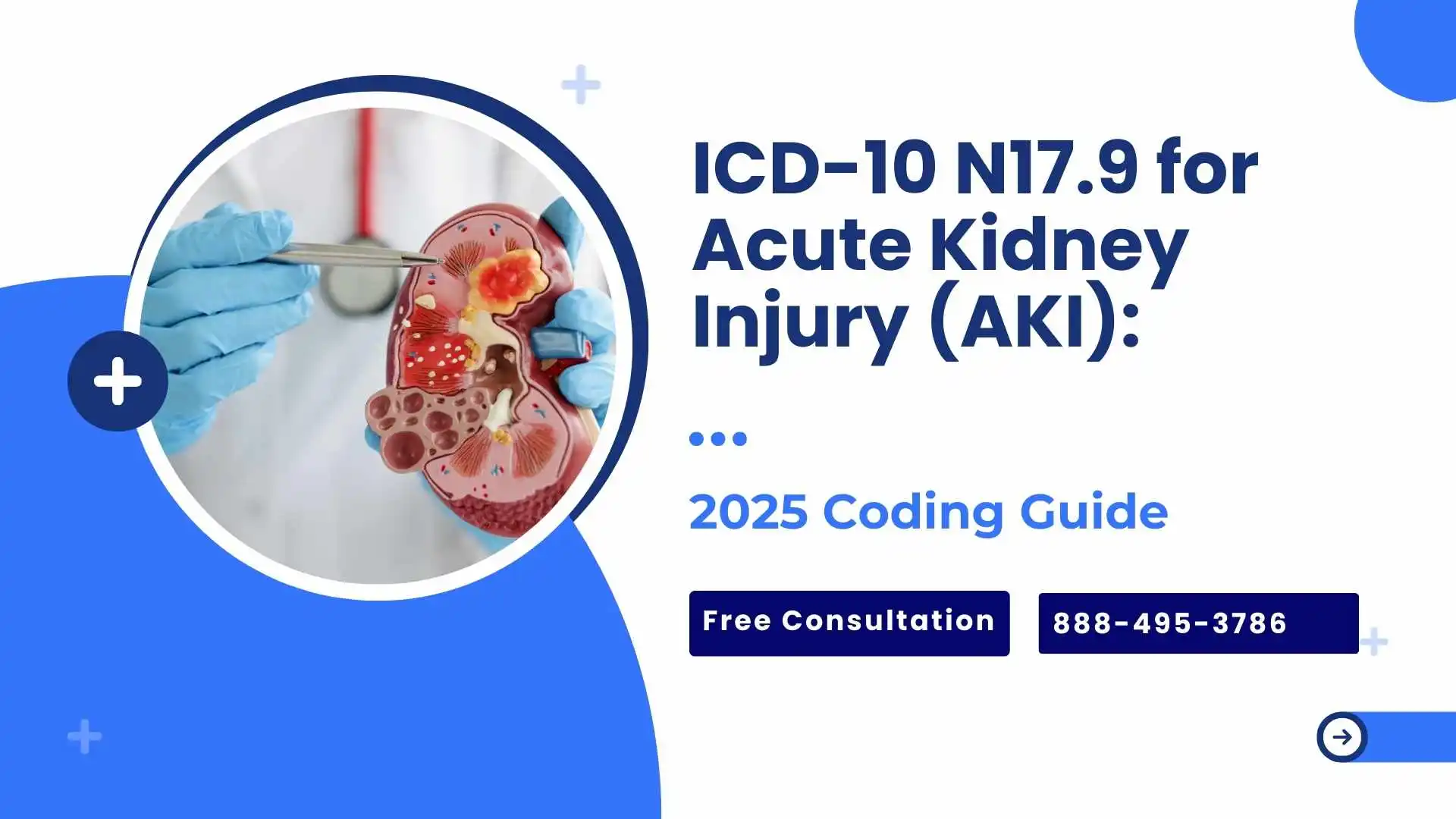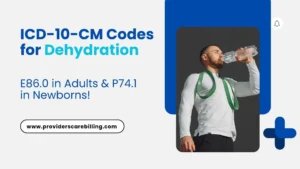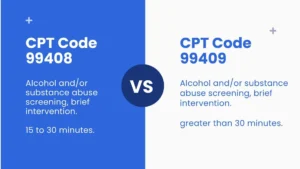Acute Kidney Injury (AKI) is more than a common complication; it is a marker for other serious health issues. With proper AKI ICD-10 coding, care and payment for services can be optimized. Annually, millions receive new diagnoses, and for medical coders, doctors, or billing officers, a proper understanding of ICD-10 for acute kidney injury ensures accurate diagnosis and claim processing.
This article aims to equip you with the skills to master the AKI ICD-10 code and empower you for its proper usage in the year 2025.
What is Acute Kidney Injury?
Acute kidney injury ICD-10 shows a problem in kidney function. It can occur over hours or days and can be reversed, but only if detected early.
Causes of AKI include the following:
· Severe dehydration
· Infections, which may be indicated by kidney infection ICD-10
· Sepsis
· Due to the side effects of medicines, especially nephrotoxic medications
· Shock or major surgical interventions
This condition is also referred to as acute kidney failure and is characterized by a rise in creatinine and/or a reduction in urine output.
Severity of acute kidney injury is graded with the use of the KDIGO stages, which will also assist the coders in the right assignment of the ICD-10 codes for AKI.
When should you apply AKI ICD-10 codes?
Use the Acute kidney injury code in the following conditions.
· There is a change in kidney function.
· Prior clinical records contain any of AKI, ARF, or kidney failure.
· Serum creatinine levels: The patient is registered to have elevated serum creatinine levels.
· Acute condition: The condition is acute, not chronic.
Avoid applying these codes in cases of longstanding kidney issues; use CKD codes instead in these situations.
Primary & Specific ICD-10 Codes for AKI
The focused ICD-10 for kidney failure is:
· N17.9: Acute kidney failure, unknown cause.
This should be used when the diagnosis is confirmed, but the type or specific cause is not yet known.
Other important codes are:
· N17.0: With tubular necrosis
· N17.1: With acute cortical necrosis
· N17.2: With medullary necrosis
· N17.8: Other acute kidney failure
Using these codes clarifies the document and makes it easy for insurers to pay for the correct service.
The term AKI ICD-10 includes all above mention codes. Detailed documentation is very important for a clear picture of coding.
H2: Optimizing Billing with Acute Renal Failure ICD-10
Here are some tips to enhance your claims:
· Always link the cause of AKI to its causes, like Sepsis, Dehydration, or Contrast agents.
· Use secondary codes for the associated comorbidity, for instance, E86.0 for dehydration.
· In cases when acute kidney injury is also related to a chronic condition, then use AKI and CKD.
· AKI cases with exposure to contrast agents should be coded with N17.0.
· If the renal insufficiency is present, inform the coder for verification before payment processing.
Practical Coding Case Scenarios
| Scenario | Primary Code | Additional Codes |
| AKI due to dehydration | N17.9 | E86.0, A09.0 |
| AKI post-contrast injection | N17.0 | Y84.8 |
| AKI with CKD Stage 3 | N17.9 | N18.3 |
| AKI during surgery (hypotension) | N17.8 | I95.9, Z53.09 |
| AKI with sepsis | N17.9 | A41.9 |
Using the combined codes not only documents the entire clinical narrative, but also mitigates the risk of audit and speeds up the reimbursement process.
Checklist for the Acute Kidney Injury Detail Coding
For the ICD-10 code for acute kidney injury, verify the below:
· Documentation consists of a singular phrase containing the acronyms AKI, ARF, or acute renal failure.
· Documented serum creatinine levels alongside decreased urine output.
· Documented infections, dehydration, or drug reactions.
· Document the CKD code as well if AKI develops on the background of CKD.
· Provide staging as defined by KDIGO guidelines as Stage 1, 2, or 3.
· Clinical actions described (administered IV fluids, dialysis, etc.)
Real Case – Real Codes
A 72-year-old patient named Rafique, suffering from type 2 diabetes and hypertension, is now diagnosed with dehydration and UTI. His creatinine level is also raised to 4.0 mg/dl within 24 hours with no lasting damage to the kidneys.
Coding Summary:
· N17.9 – Acute kidney failure.
· E86.0 – Dehydration.
· N39.0 – Urinary tract infection.
· N18.3 – CKD Stage 3 (pre-existing).
This demonstrates the interplay of the ICD-10 code for AKI with other relevant codes to depict the entire case.
Final Thoughts: As always, Code Smarter with Providers Care Billing LLC
Using the ICD-10 code for ARF or the ICD code for acute renal failure incorrectly is going to result in payment delays or claim denials.
In the case of AKI with CKD, or more complicated scenarios like immunotherapy-induced AKI, or even the straightforward cases, the professional’s focus needs to lie in accurate detail.
That’s where Providers Care Billing LLC comes in. Located in Illinois and serving nephrology clinics throughout the United States, we have deep experience in high-complexity claims, including claims with the ICD-10 code AKI diagnosis.
Why Choose Us?
· 4.9-star reviews
· Industry-best service rate starting at 2.49%
· 100% client satisfaction
Let us assist you in maximizing collection, reducing denials, and remaining compliant.
Reach out to Providers Care Billing LLC today, and experience the difference where accuracy and skill intertwine.
Our expertise extends beyond Illinois. We provide dedicated medical billing services for practices in Connecticut, Washington and all over USA. No matter where your practice is located, we offer comprehensive billing solutions across the United States.
FAQs:
Q1: Which codes apply to the AKI on CKD scenario?
For AKI on CKD, it is best to code acute kidney injury to N17.9 and append the appropriate stage of CKD, for example, N18.3 for stage 3. This is how acute chronic renal disease ICD-10 is properly captured. Both codes should be documented.
Q2: Is ARF ICD-10 the same as acute kidney injury?
Yes, there is no difference between ARF and AKI. Both conditions are documented under the same code, ICD-10 N17.9. Terminology may vary, but coding is mostly the same.
Q3: What if AKI was triggered by sepsis?
AKI can be coded as N17.9 and supplemented with appropriate code for sepsis, like A41.9 for unspecified sepsis. The AKI should always be documented with the sepsis so the dependency is clear for the coders.
Q4: What if hypotension is the causative factor for the AKI?
If hypotension is the causative factor or worsens the condition, then N17.8 or N17.9 AKI in conjunction with I95.9 for hypotensive ICD-10. Be certain there is a note from the provider attributing the condition to hypotension.
Q5: What if the patient is noted to have azotemia, but there is no documented diagnosis of AKI?
If there is only a mention of azotemia, the best code to use is R79.89. But in cases where AKI is suspected or diagnosed, always use N17.9. Your coding should be dependent on the clinical note.
Q6: In which states does Providers Care Billing LLC offer medical billing services?
Providers Care Billing LLC proudly serves healthcare providers in multiple states, including Illinois, Minnesota, Massachusetts, Georgia, Pennsylvania, Ohio, and all over USA. We tailor our billing solutions to meet the unique requirements of each state, ensuring accuracy and compliance.
Related: If your practice also handles cardiovascular conditions, explore our detailed guide on Aortic Stenosis ICD-10 I35.0 for more accurate coding.





